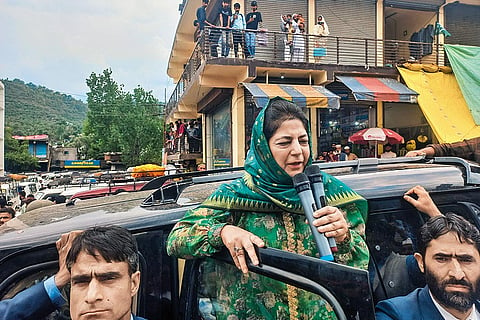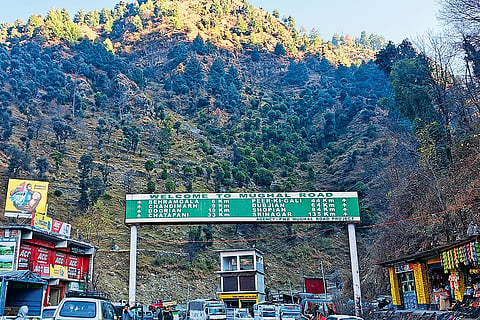aOne of the most keenly watched Lok Sabha seats in Kashmir this time is Anantnag-Rajouri. The carving of this new seat—by the Delimitation Commission in May 2022—surprised everyone and many alleged that the BJP had come up with this idea to make inroads into the Kashmir Valley. Though the Bharatiya Janata Party (BJP) is not contesting from this seat, there is speculation that the party may lend tactical support to the Apni Party’s candidate, Zaffar Iqbal Manhas, a Pahari from Shopian district of Kashmir.
Anantnag-Rajouri Lok Sabha Seat: A Tense Battle On The Anvil
The newly carved-out constituency of Anantnag-Rajouri is set to witness a very close contest
The commission has included the Muslim-majority districts of Poonch and Rajouri from Jammu into Anantnag, with the exception of the Kalakote-Sunderbani assembly segment, which is Hindu-dominated. This decision seemed puzzling as these areas have distinct cultures, languages, and geography, and are separated by the formidable Pir Panjal mountain range.
So the real battle for this constituency is between the National Conference’s (NC) Mian Altaf, a prominent Gujjar leader, and the president of the People’s Democratic Party (PDP), Mehbooba Mufti. Former Congress leader Ghulam Nabi Azad, who declared his candidacy for the constituency, had initially brimmed with confidence. But like the BJP, he realised the challenges of making headway in this region, and took back his nomination.

NC Vice President Omar Abdullah says that Altaf has been nominated since he “possesses both political and spiritual powers”. Altaf also has the support of the Congress and the CPI(M). Mufti—who has been focusing on the Rajouri-Poonch area for a long time taking up the causes of the local people—hopes that many Gujjars and Paharis will break tradition and vote for her. Despite the fact that some of her former MLAs have switched over to other parties like the Apni Party, her appeal to voters remains strong after the abrogation of Article 370.
“I see south Kashmir as a contest between Altaf and Mufti,” says Shafiq Mir, president of the All Jammu and Kashmir Panchayat Conference. Mir, who hails from the Bulfiaz area of Poonch, says that the BJP had hoped to win this constituency after giving reservations to the Paharis, but like Azad, the party realised that it was better to refrain from contesting and save face. He says the delimitation has made Rajouri-Poonch a more prominent region in the electoral map of J&K. “We were not counted when we were with the Jammu constituency,” he adds.
The Anantnag-Rajouri constituency is a mix of 18 assembly segments, with 11 in Kashmir and seven in Rajouri-Poonch. This blend of terrains has brought forth new dimensions, including the tussle between Paharis and Gujjars. While close to 50 per cent of the voters are Kashmiri Muslims, the remaining 28.5 per cent are Paharis and 21.5 per cent are Gujjars and Bakerwals.

The Gujjars and the Bakerwals belong to the same ethnic group. Bakerwals are pastoral nomads who travel across the region with their livestock, while the Gujjars are mostly settled in the Valley and raise cattle. While the Gujjar-Bakerwal community was officially recognised as Scheduled Tribes (ST) in 1991, the Paharis—who are a distinct social and linguistic group—were granted ST status on February 22, 2024, despite resentment and fierce opposition from the Gujjars as they describe them as an ‘elite class’.
Unlike Kashmir, Rajouri-Poonch always witnesses a high voter turnout. Mufti’s daughter, Iltija, has often warned the Gujjars speaking in their Gojri language that their land and homes are at risk. She says that her mother would fight for their cause and identity. Addressing the Mendhar area of Poonch on April 27, she stated that the Lok Sabha elections were not about development, but about expressing resentment against the revocation of Article 370 on August 5, 2019. “When they uproot you from your homes and forests, they don’t differentiate between Gujjars and Paharis,” she says. Abdullah echoes similar sentiments that this election is not about development, roads and electricity.
Author and political analyst Zafar Choudhary says the constituency is the first major change in the post-2019 political landscape. “The Pir Panjal Range separating the Jammu division from the Kashmir Valley has historically been a bulwark against politics and culture, filtering ideas and movements from one side to the other,” he says.
Choudhary adds that this constituency drags a bit of Jammu into Kashmir and vice a versa to eventually create a political middle ground in this high altitude seat. “I see this region emerging as the future centre of the politics of Jammu and Kashmir which is informed of the sentiments on both sides,” he adds.
However, regardless of who wins the Rajouri-Anantnag seat, it will ultimately be considered a ‘Kashmiri seat’ as the three prominent candidates from the constituency are from Kashmir. “The constituency was essentially designed to divide Kashmiris and Muslims, but it is now backfiring and leading to Muslim unity and consolidation,” says a local regional leader.
Meanwhile, the Election Commission of India (ECI) has rescheduled the Lok Sabha polls in this south Kashmir seat from May 7 to May 25. The ECI intervened after many political parties and three candidates shared concerns about the election schedule. They pointed out the tough weather conditions like snowfall on the 84-km-long Mughal Road that links Kashmir Valley with the Poonch district of Jammu.
“We’ve been hearing rumours that the BJP and their allies are plotting such a move, citing the condition of the Mughal Road,” Abdullah had said. Mufti too had questioned the rescheduling saying that it would be akin to rigging the polls as it was done in 1987, which could have dangerous consequences. She has attacked the NC, widely alleged to have rigged the 1987 elections in J&K, which is seen as the trigger for the three-decade-long insurgency.
Naseer Ganai in Srinagar. This appeared in print as Across The Pir Panjals.
